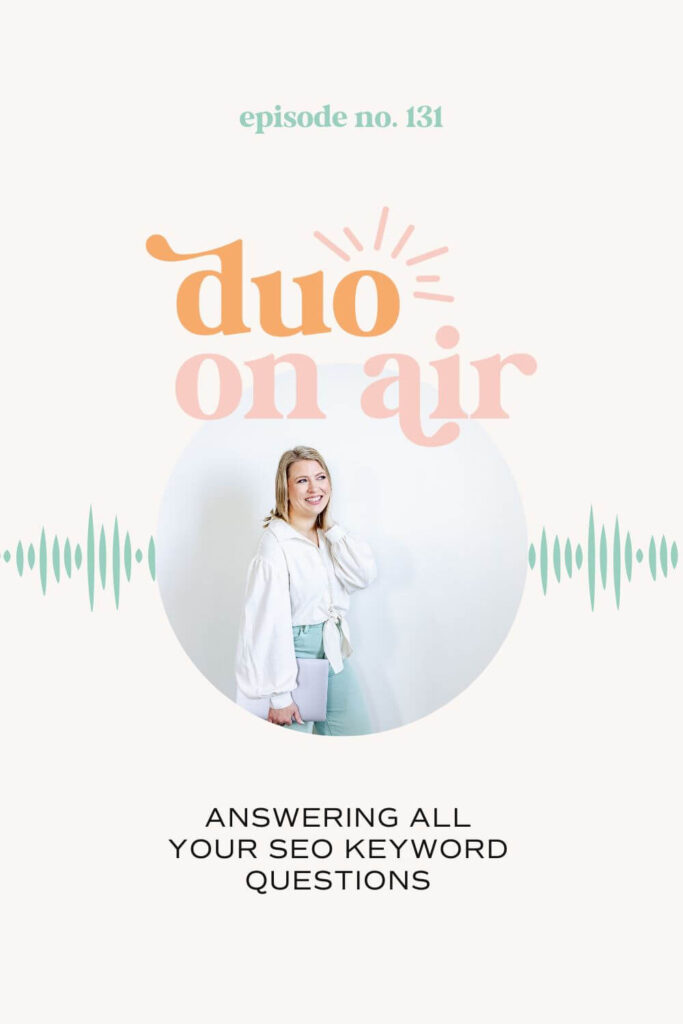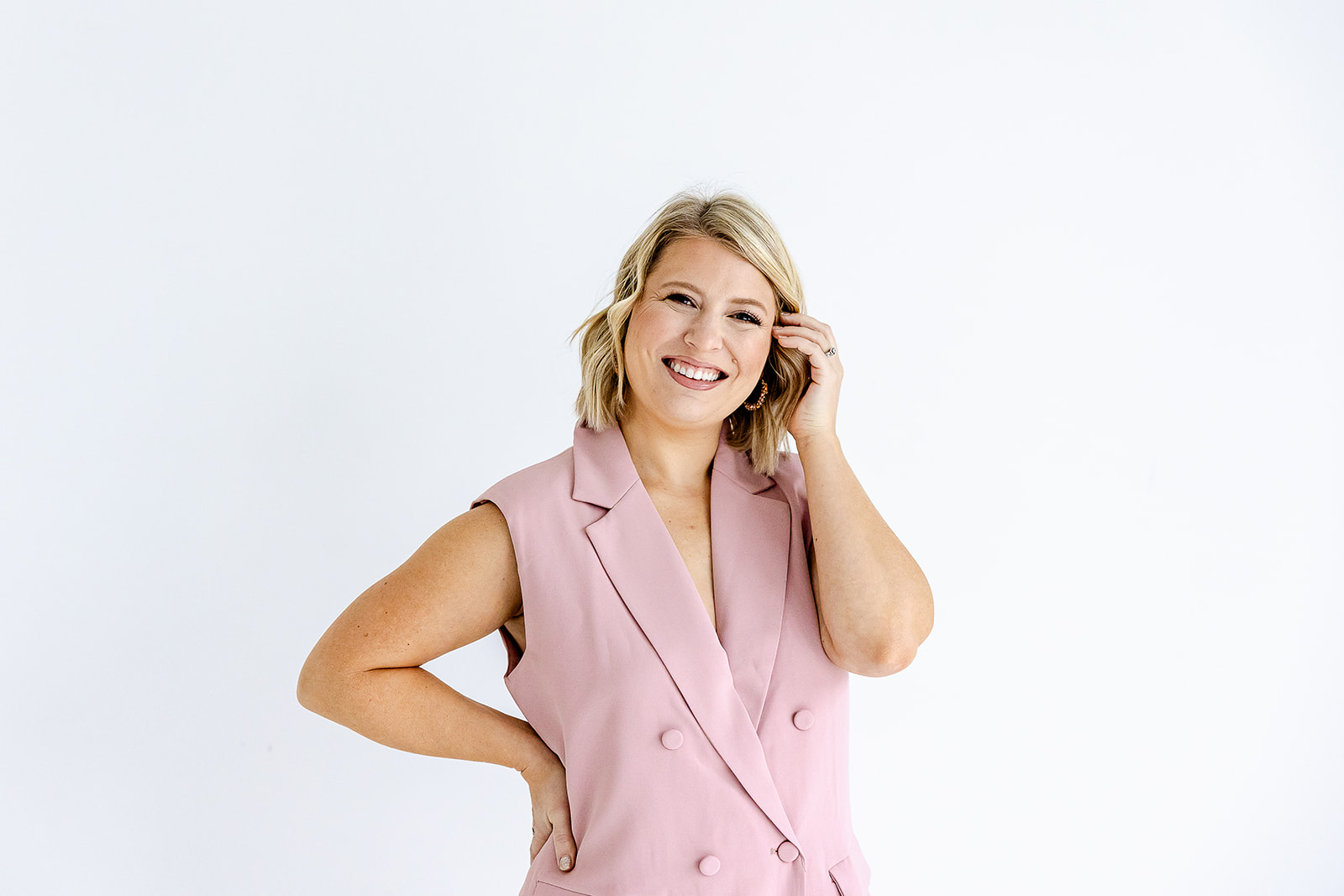Apple Podcasts | Spotify
Today we are doing something a little different. Abbey is going to answer some of your biggest SEO keyword questions.
When you first start navigating into the world of SEO, keywords are usually one of the first things you hear about because this is where the search process begins. Someone types a word or phrase into a search bar and hits enter.
That keyword is what you want to target in your content. But how do you find the right one? What are the types of keywords out there? That’s just a taste of the SEO keyword questions you’ll hear answered in this episode!
What is a keyword?
Let’s start with the most basic SEO question.
Those words are being typed into the search bar by your ideal audience. If you aren’t using those words on your website or know what those words are, then you likely won’t show up as a result.
Is there such a thing as the perfect SEO keyword?
If you are looking for a single keyword to bring you all your clients or customers, then you are wasting your time. There is no such thing as a “perfect keyword”.
Chances are that people are going to find you in a lot of different ways. It won’t be just one way, which is why you need a lot of different keywords.
I like to think of keywords as test-and-learn opportunities. It’s easy enough to change them… seriously!
Does Keyword Density Matter?
In other words, does it matter how often you use a keyword in your content? The answer here is tricky… sometimes.
One of our favorite SEO tools is the Keywords Everywhere Plugin for Chrome. You can see the number of words on a page and the amount of times someone used that keyword on that page.
We decided to test this for ourselves. We took one of our sales pages and naturally found places where we could add the keyword to our copy.
Isn’t that keyword stuffing?
That sounds a bit like keyword stuffing and it easily could go that far if you aren’t cautious.
We wanted to optimize our SEO On Tap page for “DIY SEO Course”. We naturally used “SEO Course” a lot throughout the copy, but we didn’t have DIY in there. It was a super simple update that wasn’t stuffy at all.
In less than two weeks we went from being on page 5 to being on page 1! So density did matter here.
But that’s not the case for one of our blog posts about conferences for entrepreneurs. The keyword that drives the majority of traffic to that page (600 clicks in the last three months) is “high-end entrepreneurship events”. We don’t use that keyword a single time in the post. Yet, we still rank #1 for that keyword on Google.
So what’s the verdict here? Context and quality matter more than density
What are the 4 different types of SEO keywords?
Did you know there were four types of keywords? This all comes down to what we just talked about… Context.
Informational Keywords
When people are looking to learn something, they use words like ‘how to do this’ or ‘what is this’.
Navigational Keywords
These are used when someone is trying to find a specific website or page. For example, if someone searches for ‘Duo On Air Podcast‘, that’s a navigational keyword.
Transactional Keywords
Transactional keywords indicate someone is ready to buy or take action. Words like ‘buy’, ‘discount’, or ‘coupon’ often fall into this category
Commercial Investigation Keywords
These are used when someone is researching a product or service before making a purchase. They might search for reviews or comparisons of products or offerings
Context matters when choosing a keyword. If you choose a more transactional keyword and use that word to write a blog post, you likely won’t rank for it because Google will be prioritizing product pages and shopping sections.
It’s always wise to Google your keyword first before using it on your website to see how Google is displaying that word. What’s showing up in search results? Is it mostly blog posts, sales pages, or product pages? This will help you decide how to use the keyword yourself.
Now there are two more really big questions we get asked all the time:
How do I find SEO keywords? What criteria make up a good keyword?
Those two questions are exactly what we are covering in our new masterclass. We’ll cover clear step-by-step actions on how to find a good keyword, no matter what you are writing or creating.
We are going to break down…
- How to find a good keyword when you have no idea what to write about
- How to find a good keyword when you think you have some idea
- How to back into a keyword when you already have a topic idea
You’ll leave the class with actionable steps and confidence in choosing an SEO keyword.
Save your seat on Tuesday or Wednesday to join us live! If you can’t make it, we will share the replays, but you’ll want to join us live – the Q&A time is always gold and there are some extra special goodies for those joining us live.
We can’t wait to see you there!

If you liked today’s episode on The Duo On Air Marketing Podcast, don’t forget to leave us a review & subscribe!
More From The Duo
Sign Up for Tuesday Tips and Sips Newsletter
Abbey Oslin and Courtney Petersen are Minnesota-based marketing experts, educators, and co-founders of boutique marketing agency Duo Collective, which specializes in SEO, social media strategy, and branding for small business owners and creative entrepreneurs. To learn more about Duo Collective, or to inquire about working with our team, head over to www.duocollective.com.

+ show Comments
- Hide Comments
add a comment